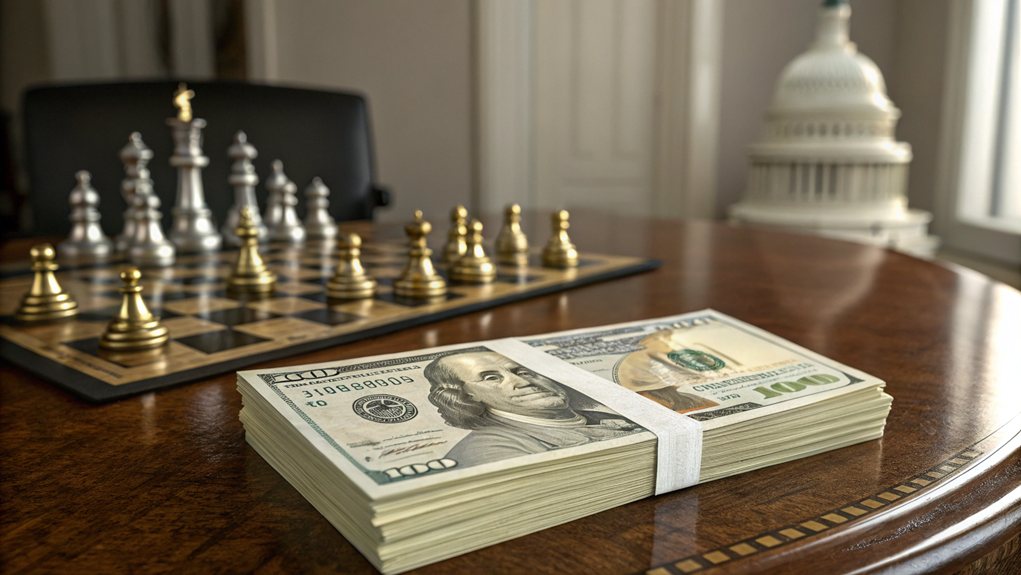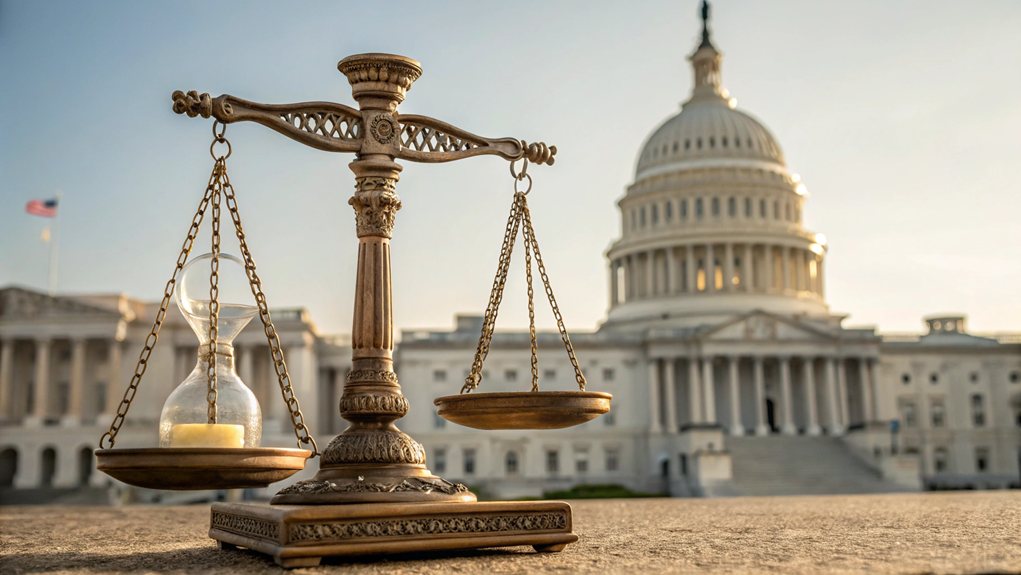Campaign finance regulation is a tangled mess of laws telling folks how to toss money at politics. The Federal Election Commission (FEC) oversees it. There are strict limits on how much individuals, PACs, and parties can donate. Super PACs? They can spend like there's no tomorrow. Transparency is key—donors are tracked, and you better comply or face scrutiny. Different states have their own rules, adding to the confusion. Stick around for more eye-opening details on this chaotic system.

Campaign finance regulation can feel like a tangled web of rules and loopholes, and let's be honest—it's not the most thrilling topic out there. But it's vital. At its core, campaign finance is governed by laws like the Federal Election Campaign Act (FECA) and the Bipartisan Campaign Reform Act (BCRA). These laws set the stage for how money flows in politics, and they're overseen by the Federal Election Commission (FEC). Contribution limits are enforced to ensure fairness in political funding.
But wait, there's more! Each state has its own rules for non-federal elections. It's a patchwork, really. Campaign finance laws apply to state and local candidates, which adds another layer of complexity to the already intricate regulations.
Contribution limits are a big deal. Individuals can only donate so much to candidates and parties. Political Action Committees (PACs) have their own limits, and parties are capped too. However, here's the kicker: candidates can pour unlimited personal funds into their campaigns. Super PACs play a significant role in this landscape, as they have the ability to raise unlimited sums of money, further complicating the influence of contributions.
Contribution limits shape the game, but candidates can still unleash their personal fortunes—talk about a financial wildcard!
Transparency? That's where it gets interesting. Donations must be reported to the FEC, so every penny is tracked—kind of.
Then there's independent spending. Super PACs can rake in unlimited cash for expenditures that don't directly coordinate with campaigns. Citizens United opened that door wide, allowing corporations and unions to spend freely. This leads to a barrage of issue advocacy. The catch? No coordination allowed. It's like a game of telephone, but with millions of dollars at stake.
Public funding pops up in some states, but good luck figuring out how that works. Candidates must meet specific criteria, and even then, the funds are allocated based on performance. It's like a political popularity contest.
Spending limits? Some places have them, others don't. Compliance is a challenge, and the variations across states could make your head spin.
In the end, campaign finance regulation is an intricate dance of money and power, with constant scrutiny and enforcement efforts. It's messy, it's complex, and, let's face it, it's fundamental for fair political competition.
Frequently Asked Questions
What Are the Main Goals of Campaign Finance Regulation?
The main goals of campaign finance regulation? Simple.
First, it's about preventing corruption. No one wants politicians playing favorites with cash.
Then there's transparency—who's funding the campaigns? Voters deserve to know.
Fair competition is also key; limits on contributions keep the rich from buying elections.
Finally, enforcement is essential. If rules are broken, there need to be consequences.
It's all about keeping the electoral process clean and honest.
How Do Campaign Contributions Affect Election Outcomes?
Campaign contributions can seriously sway election outcomes. More cash often means a better chance of winning—simple as that.
Challengers thrive with funding, while incumbents? Not so much; they're already in the club.
Donors? They're like stock traders, betting on political winners.
But here's the kicker: pouring money into campaigns doesn't always translate into policy changes. Instead, it can just keep the same folks in power.
It's a wild, messy game.
What Are the Penalties for Violating Campaign Finance Laws?
Violating campaign finance laws? Get ready for some serious consequences. Fines or warnings for minor slip-ups, sure. But go big? Expect criminal charges and maybe even jail time.
Each state has its own rules, so good luck keeping track! And let's not forget the reputation hit—public disgrace isn't a good look.
All these penalties? They're meant to keep elections clean and corruption at bay. So, play by the rules, or face the music.
Can Individuals Donate Unlimited Amounts to Political Campaigns?
No, individuals can't just throw cash at political campaigns like it's a game of Monopoly.
There are limits—$2,800 per election, to be exact.
Sure, they can give more, but only to political action committees or parties, not directly to candidates.
It's like a weird game of financial hopscotch.
The rules exist to keep things from spiraling into outright chaos, or worse, a bidding war for votes.
Money talks, but not without some boundaries.
How Do Different Countries Regulate Campaign Finance?
Countries tackle campaign finance differently. Some impose strict limits on contributions, while others let the cash flow like a river.
Spain leans heavily on public funding—because who doesn't love taxpayer-funded campaigns? Transparency? Yeah, that's a big deal, with many banning anonymous donations to avoid shady dealings.
But let's be real; loopholes exist. So, while regulations try to keep it fair, the game remains as messy as ever. Welcome to politics!







